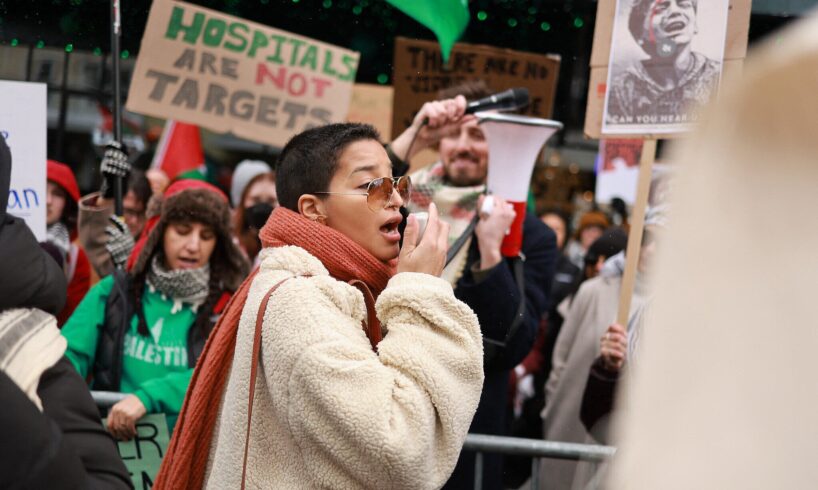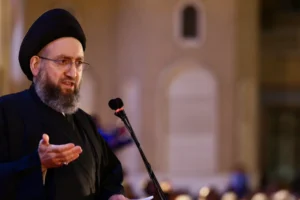
From publishing to the music and film industries, growing numbers of Western artists are calling for a cultural boycott of Israel over the Gaza war, hoping to emulate the success of the apartheid-era blockade of South Africa.
With most Western governments resistant to major economic sanctions, growing numbers of celebrities, musicians, and writers are hoping to build public pressure for more action.
“There is absolutely no doubt in my mind that, globally, we’re at a tipping point,” British actor Khalid Abdalla (“The Kite Runner,” “The Crown”) told AFP after signing a petition calling for a boycott of some Israeli cinema bodies.
The open letter from Film Workers for Palestine has gathered thousands of signatories, including Emma Stone and Joaquin Phoenix, who have pledged to cut ties with any Israeli institutions “implicated in genocide” — a charge Israel has repeatedly rejected.
The Film Workers for Palestine pledge is distinct from other previous arts and culture Israel boycotts in naming specific Israeli cultural institutions that the letter’s signatories are boycotting. Those include major Israeli film festivals like the Jerusalem Film Festival, Haifa International Film Festival, Docaviv and TLVfest, the LGBTQ film festival in Tel Aviv.
Get The Times of Israel’s Daily Edition
by email and never miss our top stories
By signing up, you agree to the terms
“The avalanche is happening now, and it’s across spheres. It’s not just in the film worker sphere,” Abdalla added during an interview on Friday.
Several winners at this week’s Emmy Awards, including Javier Bardem and “Hacks” actor Hannah Einbinder, spoke about Gaza, echoing similar statements at the Venice Film Festival earlier this month.
Hannah Einbinder accepts the award for outstanding supporting actress in a comedy series for ‘Hacks’ during the 77th Primetime Emmy Awards on September 14, 2025, at the Peacock Theater in Los Angeles, California. (AP Photo/Chris Pizzello)
And on Thursday, British trip-hop pioneers Massive Attack announced they were joining a music collective called “No Music for Genocide” that will see artists try to block the streaming of their songs in Israel.
Meanwhile, authors have signed open letters against Israel, several European nations have pledged to boycott next year’s Eurovision song contest should Israel participate, and Spanish Prime Minister Pedro Sanchez is leading a push to exclude the country from sports events.
Israeli conductor Ilan Volkov announced last week at a concert in Britain that he would no longer perform in his home country.
Inside Israel, many artists worry about the consequences of the boycott movement.
Israeli conductor Ilan Volkov stunned the audience with an emotional speech denouncing Israel’s war on Gaza at the BBC Proms in London.
Volkov, who led the BBC Scottish Symphony Orchestra at the Royal Albert Hall, said he carried “great pain” and could no longer stay silent.… pic.twitter.com/GCLeNpostZ
— Middle East Eye (@MiddleEastEye) September 15, 2025
Israeli screenwriter Hagai Levi (“Scenes from a Marriage”, “The Affair”) told AFP earlier this month that “90 percent of people in the artistic community” were against the war.
“They’re struggling, and boycotting them is actually weakening them.”
Antisemitism
Hakan Thorn, a Swedish academic at the University of Gothenburg who wrote a book on the South Africa boycott movement, said it appeared to be comparable to the current boycott movement against Israel.
“I think we are seeing a situation which is comparable to the boycott movement against apartheid South Africa,” said the sociologist. “There was definitely a shift in the spring of this year when the world saw the images of the famine in Gaza.”
Israel disputes findings of famine in the Strip and blames aid delivery problems on Hamas looting and the inability of UN and international agencies to adequately deliver the goods.
The international boycott of South Africa’s white supremacist government began in earnest in the early 1960s after a massacre of black protesters by police in the Sharpeville township.
Anti-Israel protestors and BDS activists hold Palestinian flags and a banner reading ‘Country of apartheid … Israel,’ during a demonstration prior to the grand final of the Eurovision Song Contest 2025 in Basel, Switzerland, May 17, 2025. (SEBASTIEN BOZON / AFP)
It culminated with artists and sports teams refusing to play there, with boycott busters such as Queen and Frank Sinatra facing widespread public criticism.
Thorn said many public figures were reluctant to speak out about the Gaza war, which was sparked by the Hamas onslaught of October 7, 2023, that killed some 1,200 people and saw another 251 hostages taken. Since then, attacks on Jews have also spiked worldwide, according to data from Jewish community groups in several countries.
According to Thorn, accusations of antisemitism have led to fewer people speaking out against the Gaza war.
“The history of the Holocaust and criticism of the pro-Palestinian movement for being antisemitic has been a serious obstacle to a broader mobilization against what Israel is doing right now,” said Thorn.
A campaign to boycott Israel, known as the Boycott, Divestment and Sanctions (BDS) movement, began 20 years ago. Israel accuses BDS supporters of antisemitism, and Prime Minister Benjamin Netanyahu frequently labels critics of the country as “Hamas sympathizers.”
BDS activists hoist an anti-Israel banner in Belfast, Northern Ireland, April 11, 2023. (AP Photo/Peter Morrison)
David Feldman, who heads the Institute for the Study of Antisemitism at Birkbeck College at the University of London, said such statements have created “a lack of confidence over what the boundaries of antisemitism actually are.”
“Any eruption of antisemitism is concerning, but any attempt right now to identify the movement to boycott Israel with antisemitism is missing the point,” he told AFP. “It is a vehicle of protest against Israel’s destruction of Gaza and the ongoing murder of people.”
Apartheid lessons
Although the anti-apartheid movement is referenced by today’s campaigners against the Gaza war, history provides some sobering lessons for them.
After the start of the South Africa boycott movement, it took 30 years before the regime fell, exposing the limits of international pressure campaigns.
A mass funeral takes place in Sharpeville, South Africa, for victims of the Sharpeville Massacre in which 69 people were killed when police opened fire on black demonstrators protesting against the government’s apartheid policies and the arrest of their leaders, March 30, 1960. (AP Photo)
“By the early 1970s, it’s true to say that boycott was the defining principle of a self-identified global anti-apartheid movement, but the movement on its own was not enough,” Feldman, who wrote a book about boycotts, added.
The real pain was caused by the gradual asphyxiation of the South African economy as companies and banks withdrew under pressure, while the end of the Cold War sharply increased the country’s isolation.





